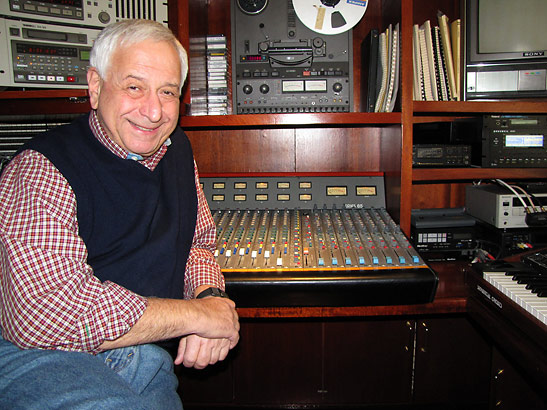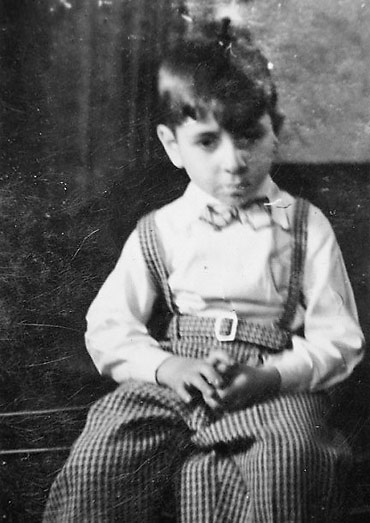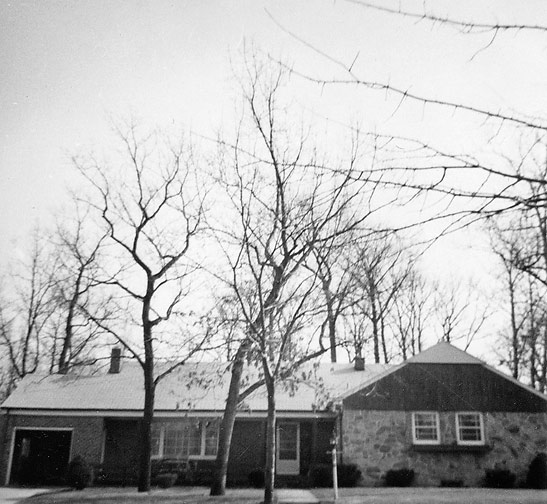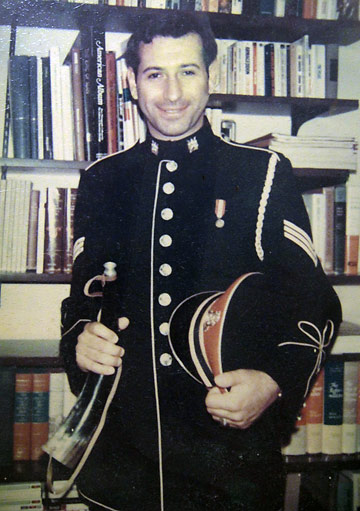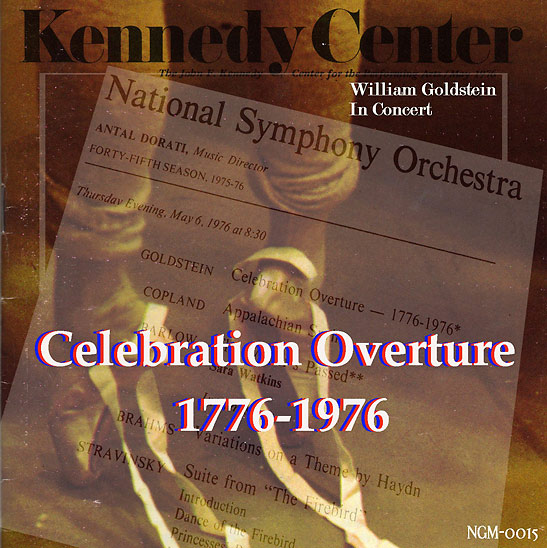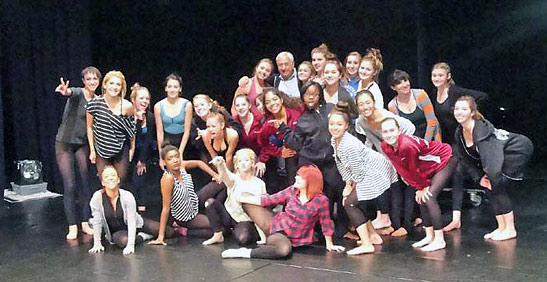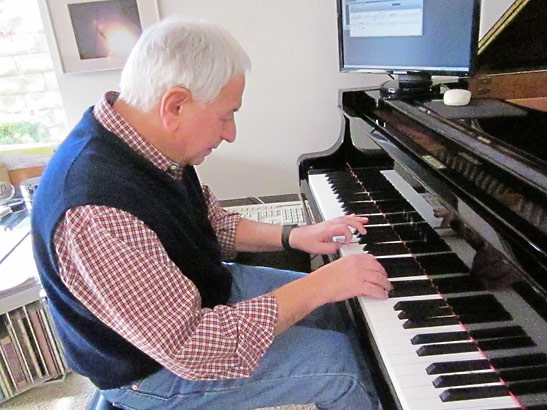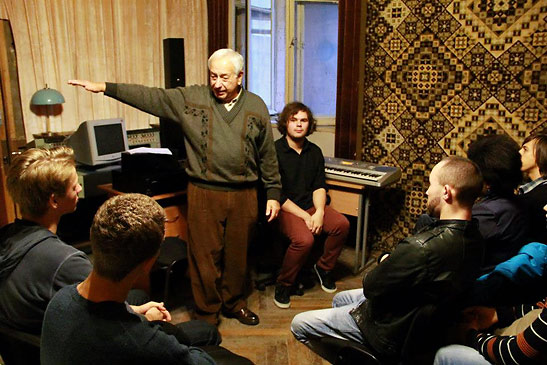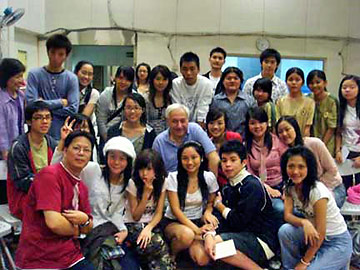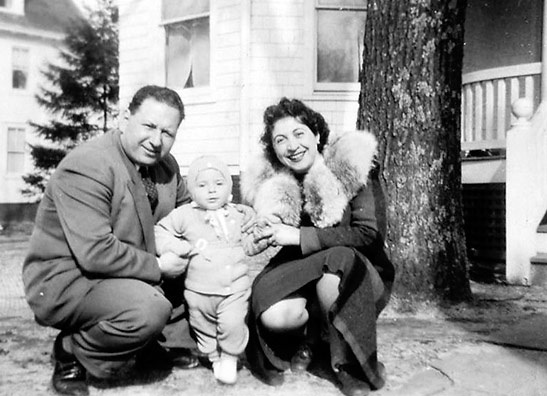 |
 |
|
 |

|
Up Close & Personal
With William Goldstein The Musical Journey of a Boy Prodigy to World Renowned Composer and Electronic Technology Pioneer Beverly Cohn
 illiam
Goldstein, a true Renaissance Man, was born with the rare gift
of genius that was manifesting by the time he was three years old when
he could sit down at the piano and play by ear. By the time he was eight,
he would go to the movies and was able to play songs and themes after
seeing the film just once. illiam
Goldstein, a true Renaissance Man, was born with the rare gift
of genius that was manifesting by the time he was three years old when
he could sit down at the piano and play by ear. By the time he was eight,
he would go to the movies and was able to play songs and themes after
seeing the film just once.
His musical accomplishments, which span all musical genres, are legion, scoring 50 film and TV projects, including 48 episodes of "Fame," Disney's "The Miracle Worker," "Twilight Zone" and "Shocker." He is a founder of the Museum of Contemporary Art in Los Angeles, a director of the California State Summer School for the Arts, and serves on both the Music Branch Executive Committee and Foreign Language Committee of the Academy of Motion Picture Arts and Sciences. Goldstein also achieved prominence as an innovator of new technology and pioneered the first completely computer sequenced direct digital score for a Peter Guber project called "oceanQuest" which CBS Masterworks released as "Oceanscape," and created the first full musical score for an interactive computer game called "King's Quest Four" which revolutionized that industry. He is also a roving ambassador for the Academy and lectures all over the world on contemporary aesthetics and the role of music in film.
Mr. Goldstein recently sat down with your reporter in his studio for an exclusive interview and the following has been edited for content and continuity. Cohn: What happened when you were nine years old at Columbia University? Goldstein: I was there for an interview and an evaluation with Professor Raymond Burrows at the Teachers College at Columbia because I was a child prodigy. But we should back up before then. I grew up in a non-musical family. We didn't have a piano in the house. My mother couldn't carry a tune, but she liked classical music. My parents were in the hotel business and during the summer, we lived in the summer hotel where there was a piano. I was told that when I was three or four I started picking out stuff on the piano.
Goldstein: My parents moved into the house I grew up in when I was nine. Before that we lived in a two-story house and the girl downstairs had a piano so I could play occasionally, but my parents didn't buy me a piano until I was eight. I remember that when I was eight, my parents went to California and we were at my great aunt's house in Stockton for two months. She had a piano and I had a tremendous breakthrough. That summer I was going to the movies and going home and playing scores, themes, and songs I heard. What I imagine happened, because I don't really know, is that some of the very sophisticated guests at our summer hotel said that my parents had to do something about this kid which is how I wound up going to Columbia University for that evaluation, which I remember very well. Cohn: What was the result of that meeting? Goldstein: Burrows ideally wanted me to go a conservatory. In the old days, you sent your kids to live in a host home in Moscow or Berlin, but that wasn't going to fly. He said if I couldn't study full time, how about once a week in the prep division. The prep division met on Saturday but my folks were Orthodox Jews so that wasn't going to fly either. Burrows said he would get me a teacher at a convenient time. He really wanted to see that you got the proper training. Goldstein: Oh yes. He said something that blew me away. You know I didn't feel special. I just did what I did. But, at the end of this evaluation period, my mother said it wasn't practical for us to do any of these things and Burroughs looked at her straight in the eyes and said, 'Trying to stop him would be like trying to stop the river heading to the sea." My mother did try to find someone in Lakewood (New Jersey) to teach me the piano but I was already playing and the only teacher she could find, who was a Julliard graduate, told me that I had to stop playing by ear. Well, if I heard something, I played it. That was never going to stop. So that lasted just a couple of weeks and that was it. So, I'm a classically trained pianist who never took piano lessons. Cohn: When did you learn to read music? Goldstein: Reading music came much later. I think in eighth grade I started playing trumpet so I read treble clef, but I didn't learn how to read bass clef until I was close to sixteen or seventeen. When I was eighteen, I was able to write my first orchestral work, which was performed when I was nineteen and made the front page of the Asbury Park Press and I said to myself I can do all this without studying composition. Cohn: Given that you were a child genius, did you live a rarified life?
Goldstein: I lived a rather normal life except I was one of the youngest kids in my class but I was one of the most emotionally insensitively developed, but I didn't know that. How could I know it? So, outside of the fact that I could sit down at the piano and do stuff, I played tackle football with the other kids, went sledding in the winter, and during the summers I was a really good belly surfer. In high school, I was voted the most talented in my class. Cohn: What did you do after you graduated college? Goldstein: I was fortunate enough to become composer in residence during the Vietnam War for the United States Army Band in Washington D.C. and was commissioned to write music, including a trombone concerto when I was 25. It is the most performed trombone piece and has been recorded eight or nine times by principal trombonists around the world and this year was selected by the International Trombone Association as the their competition piece. Eventually, I signed a contract with Columbia Pictures/Screen Gems in New York so I was with their publishing company, which was the place to be. It had everybody, including Carole King. Cohn: How did Motown's Berry Gordy find you? Goldstein: The Screen Gems thing led to my first movie and then I did a lot of work for ABC Television and the connection with Berry Gordy came about when I was asked to write the theme music for the morning show, "AM America." I was also doing a lot of commercials and Gordy got in touch with me to do a singles deal where I would produce as well as be an artist and composer.
Cohn: Did you enjoy all of those roles? Goldstein: I enjoyed everything. During the period when I was a Motown artist, I had just done my first movie score and the National Symphony was premiering my "Celebration Overture - 1776-1976," so I was wearing three hats – movie composer, disco artist on Motown, and symphony composer. Cohn: Are you equally at home playing jazz and classical and who are some of the composers who influenced you? Goldstein: I play jazz, but I would not call myself a jazz artist. You might say I'm equally as uncomfortable with jazz and classical because I don't fit in anywhere. All the great classical composers have influenced me. I was improvising inventions at the keyboard, which are little Baroque pieces with a couple of ideas that interact with each other. I was doing these things in the style of Bach before I knew Bach. We didn't meet until a few years later. Then when I was at Motown, I did this thing called "Back to Bach," which was a disco record. I love all the Russian romantics: Rachmaninoff, Tchaikovsky, and the French: Debussy, Ravel – and American: Leonard Bernstein and Aaron Copland, whom I met when I was a student. I'm influenced by everything I've ever heard and as far as favorites, I can't choose because I'm a person of great empathy.
Cohn: You conduct Master Classes from Las Vegas to Poland. How did that come about? Goldstein: When I was doing FAME, a number of people in the industry around 1981, decided to start the California State Summer School for the Arts. It's a fabulous program. We take high school students from all disciplines in the arts – music, acting, writing, photography, and production design – and take over Cal Arts for a four-week intensive program. Graduates of our program include James Franco, a lot of the guys at Pixar, and Broadway performers, and singers. We're turning out a lot of people who go on to become very successful. I'm a board member and once a year I do a Master Class. Outside of being a visiting artist here and there, that was the extent of sharing what I knew because I didn't know I had anything to share. The other thing is I earned a nice living writing, but my real gift is sitting at the piano and doing instant compositions. A: I didn't think it was that special and B: I didn't know anybody else who did it, but I didn't think it was as rare as I now know it is. I only know one other person who does it full time and that's Keith Jarrett. I know people who improvise, but improvisation in jazz is very different because it's improvisation around an existing structure or piece. What I'm doing is starting with nothing and creating something. Later, I'll ask you to pick three notes on the piano and those three notes will become the first three notes of the melody. That sort of insures that it is not something I've done in the past. Cohn: Were there specific events that changed your life? Goldstein: What really changed my life were two things: One: Rob Jaffe, the Executive Director of the California State Summer School for the Arts, who sadly passed away a few years ago, found out about the instant compositions and suggested that I share my creative experience and show the kids what I do. This is what I had been doing since I was a kid, but that experience changed my life. Cohn: How did the Transatlantyk International Film and Music Festival in Poznan, Poland come about? Goldstein: That was the second thing that changed my life. My instant compositions didn't really get big until in 2011 Jan Kaczmarek invited me to a festival he was putting on in Poland. He and I were talking at an Academy Music Branch meeting and I told him I had just released my second solo piano album of instant compositions. He said that was a lost art and that he wanted to have a competition in instant composition and invited me to be on the jury and do some performances. So I did and became president of the jury, did workshop performances; improvised ballets with dancers, musical conversations with singers, and it changed my life because the response was just amazing. We had 50 contestants from the entire world and not one of then could do the three-note exercise. So I began to realize that what I do is very rare.
Cohn: Can you explain your process for creating an instant composition? Goldstein: So what is the essence of what I'm doing at the piano – how am I doing that? I'm doing it the same way you get up in the morning and have a conversation with somebody. How do you speak? How is it possible for you to have an idea and express it to another human being? Well, it takes a vocabulary. So, I have a musical vocabulary – a very broad musical vocabulary. Then it takes a method of delivery. How do you get your sentences out? You speak them, right? And, the most important part of the anatomy involved in speech is your tongue and the miracle of the tongue is that you don't have to tell it where to go, do you? Nobody thinks about the tongue in his or her mouth. When I'm doing my master classes and ask people what part of your anatomy is most involved in speech, students mention the brain, the vocal chords or what – nobody thinks of the tongue. Nobody thinks about the tongue because it's so automatic. So, if you want to do what I do, just build a musical vocabulary and then build a technique that's so natural that you don't have to think about it. So my fingers on the keyboard are like the tongue in my mouth, and that's the gift I was born with. Cohn: How do you teach this to budding young composers? For a while, I was reluctant to do this because you can't teach anybody the gift, but finally, after years, I began to understand what the gift is and in explaining what the gift is to artists, I believe that having that knowledge, and increasing their vocabulary, and the level of competence with their instrument so that it becomes more natural, this knowledge will easily move anybody from one place to a much more open place and help them get in touch with their own creativity. That said, technique has always been a means to an end – not the end in itself. Cohn: What is your teaching schedule like? Goldstein: I'm really focusing on sharing the gift of instant composition. Last year was a banner year. In September and October I went on a five-week cross-country tour of performing arts high schools organized by the Executive Director of the California State Summer School for the Arts, Peggy Burt. This was an eye-opening tour in so many ways. When I got to the Denver School of the Arts, one of the finest in the country, half way through my day there, at a faculty lunch, the principal of the school said that he wanted to commission me to write a couple of pieces and wanted me to be the principal speaker at a conference in Colorado Springs which I just attended in January. I talked to all the music honor students in the state.
I was in Kiev last month and am going back to Poland in March and have invitations from Toronto and China. So, it's all about the instant compositions. The kids love it and the music students love it; people of all ages respond in very emotional ways. Cohn: Let's switch to films. The Academy Awards are coming up. Any favorites? Goldstein: I haven't decided what I'm going to vote for yet. I loved "Lincoln." I loved "Les Mis," ("Les Miserables") I really liked "Argo." I don't think "Zero Dark Thirty," is going to win the Oscar. It was a really good film, but "Argo" is a better film. "Argo," from the beginning of it, just never lets up. What I am curious about in regard to "Zero Dark Thirty" is what her (Director Kathryn Bigelow) political agenda is. She says she's not endorsing the use of force in interrogations, but of course it's war, and in this film, the outcome depends upon those techniques. Cohn: Piggybacking on that, what do you think the overarching responsibility of the artist should be? Goldstein: I think we should be as truthful as possible and that we should also try to be as inspiring as possible and if we're going to bring about change, we should put out positive energy. Whatever we're doing, no matter how vicious or terrible the story is we're telling, it should have something uplifting attached to it. A much more interesting question is not with "Zero Dark Thirty," but with "Amour," which is an extraordinarily tough film. I'm on the Foreign Language Committee and that film is probably going win, but it's not my favorite film and yet it is heart wrenching. But, what's the point of making a film like this that doesn't help somebody do something about a horrific human condition. None of us can escape the end of our lives but the end of everybody's lives is not like that. I like things that not only illuminate the human condition, but also somehow offer hope or a positive solution or resolution. Cohn: Not much has been written about your personal life. Have you ever been married? Goldstein: The odd thing about my life is that I've had a perfectly normal career as an artist. I was able to put myself through my last five of seven years of college with my earnings as a composer but never had a real life. In a spiritual sense, everything I have in life I've been given and anything I don't have has been kept from me. I fell in love when I was thirteen years old. She lived on a farm, but I couldn't go out with her until I was seventeen. When I finally went out with her, I told her I loved her and she said that she liked me very much but I'm not in love with you. So, she broke my heart. I don't know if I ever kissed this girl. She was like on a pedestal. Honestly, I believe things happen when they are supposed to happen and the right person will be there at the right time. Over the years people were attracted to me because of what I do. I do have to say that I am an incurable romantic personally, and it comes out in my music in a neo-romantic style.* I'll share one memorable relationship. I was on my way to a Club Med trip in Guadeloupe and met a girl on the plane. We started talking, met later in the day on the beach, and decided to room together for the week. We ended up in a relationship that lasted a couple of years. It was wonderful. She was an artist. She was someone I should have married but I wasn't ready. Cohn: With all your extraordinary accomplishments, is there anything in your life that feels unfinished and if so, what is your philosophical take on it? Goldstein: Sure. My personal life. But, everything happens in time and half the fun is getting there. If there is a master of the universe, the master of the universe has created this world to guarantee and insure conflict on every level. There are animal species – doves, beavers, wolves, swans – they mate once and stay loyal to that mate. They don't leave that mate and if the mate dies, they very rarely re-mate. Then there's the rest of the animal species that jumps on anything that moves. If there is a master of the universe, we could have been created like that, but we were not and because we are in "earth school", and in "earth school" we learn life's lessons by resolving the challenges put in our path, and they are all in the form of conflict. Whether it's one-on-one in the bedroom or one-on-one in the boardroom, or a war between two countries, dominance, trust, control, and territory is what it's almost always about. Human beings need constant positive stimulation. To expect all that positive stimulation to come from one person is not reasonable and people could have better relationships if they would realize that the other person is never the person they want them to be, but only the person who they are and they should try to see them as they are and not as you want them to be. Remember, the only things that work between two people are those things that are mutually desirable and if there is true love for one human being for another, it is not challenged by love for one human being for another because there is a unique dynamic between every two individuals that is not replicable with any other two individuals. And, that's what I've learned in life. Cohn: Why do you think it's so difficult to find that special person?
Goldstein: The more unusual and unique a person you are, the harder it is to find someone. I get along with lots of people and have lots of relationships – this person on this level, that person on that level. I connect with lots of people, which is one of the reasons I didn't marry early because I realized that because I connect with so many people, how do you just be with one person. Those five days being in Colorado Springs around all those talented young people was amazing. I seem to have a remarkable effect on young people, many followed me around during the festival asking questions, wanting to be photographed with me, and a few said they wished I could adopt them. What's exciting is they're at a point in their lives where everything is possible and it's great to be around people with hope and energy. I make a point when I'm lecturing that in order to really have any success as an artist, you must never lose contact with your inner child because you have to be able to feel and respond without the adult filters and with most adults, the filters are on all the time. So that's the thing about young people that I find attractive. But, of course, to find a younger person who's got that wonderful energy and has enough life experience to share with you is a challenge. I mean if you're going to have a mate, it's got to be somebody who is in tune with you in so many areas. I'm not really smart enough to have an answer to that one….
"Genius is not the ability to
take the commonalities of life and make them obtuse, but rather to take
the complexities of life and give them meaning."
– William Goldstein
Neo-romanticism is a movement that began in Britain around 1880, which crossed artistic boundaries emphasizing the importance of the representation of internal feelings. To see the complete discography of Mr. Goldstein's
over 50 works: http://williamgoldstein.com/index.html |
This site is designed and maintained by WYNK Marketing. Send all technical issues to: support@wynkmarketing.com

|











